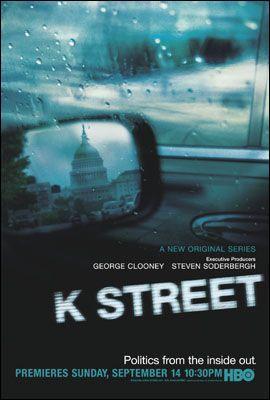K Street
What prompted me to seek out the long forgotten HBO series K Street? That Steven Soderbergh production from 2003 that only lasted ten episodes? I had heard of it back when, but it was John Slattery's later interview with Kevin Pollak that ignited some interest. The actor had rough memories of this mostly improvised docu-drama that focused on a Washington D.C. consulting firm and its lobbyists. He recalled that there was never really a script (though Henry Bean is credited as writer), and Soderbergh (who directed and shot every episode) "had it all in his head." The cast, which also includes Mary McCormack, Roger Guenveur Smith, and real life political odd couple James Carville and Mary Matalin (playing themselves) were basically instructed to wing it. Often with real D.C. heavyweights like Howard Dean and Tom Daschelle. Apparently not all of whom were aware that a fictional program was being filmed.
Slattery, who plays lobbyist Tommy Flanagan, remembers Soderbergh's constant stress over the show, something undoubtedly mirrored by the actors. Maybe these guys didn't have the improv chops of say, Fred Willard. The idea for K Street is fascinating, and in its best moments is an insightful, intelligent, and timely (for its time) gape at the D.C. machine. A town filled with liars and opportunists. Everyone, essentially a salesperson. Many have messy personal lives that might rival that of your favorite bona fide reality program.
But....Soderbergh's often agonizingly pretentious style, which would seem perfectly suited for this project, really works against it. A palpable smugness that was tough to take. Somewhere between camera-sits-on-a-tripod-in-the-corner stagnancy and the director's odd, yet undoubtedly inventive ways of framing an office conversation is the correct approach. Inventive is accurate, for all the good and bad it might connotate. There were moments when I wanted to fling the DVD out the window. This was also because of some of the dialogue, and characters that were patently unlikable. Maybe their performances were dead on. I dunno.
Some episodes work better than others. I found the early one about illegal mp3 downloading to be trite and embarrassing. As the series progresses, a plot emerges - the firm is investigated for possible illegal dealings with shady Middle Easterners. The FBI closes in. But I'm making it sound more exciting than it is. I have to say that Carville's long scene with his lawyer and the Feds during some intense questioning was almost gripping.
Occasionally we see Elliott Gould sitting in a dumpy Brooklyn apartment, repeatedly watching MILDRED PIERCE. He is one of the firm's partners, now an apparent agoraphobic.
Some of the tete-e-tete between Carville and Matalin is enjoyable, even when Soderbergh's (er, "Peter Andrew"'s) camera stalks around annoyingly. Is it worth trudging through so many disappointingly dull and flat scenes to get to that? Isn't real life supposed to be potentially more interesting than fiction? Surely the political games of the time were more engaging than this wankery?
Maybe not. Slattery also states that if K Street hadn't been made during such a dry news cycle, it might still be on today. Someone should take another crack at it. I would love to see a cinema verite style hybrid beat House of Cards and some others at their own game.




Comments